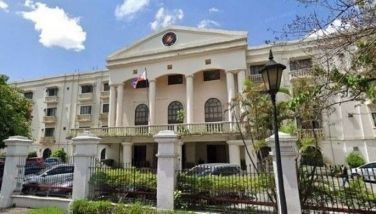BIR: No stopping EVAT
October 23, 2005 | 12:00am
There is no stopping the implementation of the expanded value-added tax (EVAT) this time but the Arroyo administration is taking steps to cushion its impact, government officials said yesterday.
James Roldan, an assistant commissioner of the Bureau of Internal Revenue (BIR), said the Arroyo administration won’t delay the implementation of the new tax since the Supreme Court upheld its legality last week because the government is depending on the tax measure to bring in necessary additional revenue.
"I think that is unlikely because the Supreme Court decided that this is constitutional, so the government has to implement this," Roldan said during an interview on Vice President Noli de Castro’s weekly radio program.
Opponents of the EVAT maintain it is unconstitutional because of a provision giving President Arroyo the authority to raise the tax from the current 10 percent to 12 percent starting in 2006, depending on certain conditions prescribed under the new law.
They say Congress has the sole power of taxation.
Meanwhile, the government is busy putting measures in place to ensure the smooth implementation of the new tax as well as to defuse criticism that it will raise prices unnecessarily.
Yesterday, the Department of Trade and Industry announced that manufacturers of basic goods have agreed not to pass along the tax’s two-percent increase in their prices, but only for the remainder of this year.
"The EVAT is expected to raise costs of producing basic goods by about two percent, which manufacturers have agreed to shoulder instead of passing it on to consumers up to (the end of) this year," said Trade Secretary Peter Favila.
The Department of Agriculture estimates that the EVAT will raise prices of farm products by an average one peso per kilo.
Agriculture Secretary Domingo Panganiban said the price of pork is expected to increase by P2 per kilo.
The VAT bill is considered to be the centerpiece of the Arroyo administration’s revenue-generating package passed by Congress to stave off a looming fiscal crisis resulting from the government’s chronic budget deficit.
The measure is expected to yield P80 billion in fresh revenues annually.
Critics of the bill said it would inevitably raise prices mainly because the new tax will also be imposed on electricity and petroleum products.
Customers of electricity retailer Manila Electric Co. (Meralco) are expected to pay an additional 60 centavos per kilowatt-hour on average.
Meralco distributes electricity to Metro Manila and the surrounding provinces.
Motorists, meanwhile, will pay P1 to P3 more per liter of petroleum at the pumps and households will pay at least three pesos more per kilogram of cooking gas.
James Roldan, an assistant commissioner of the Bureau of Internal Revenue (BIR), said the Arroyo administration won’t delay the implementation of the new tax since the Supreme Court upheld its legality last week because the government is depending on the tax measure to bring in necessary additional revenue.
"I think that is unlikely because the Supreme Court decided that this is constitutional, so the government has to implement this," Roldan said during an interview on Vice President Noli de Castro’s weekly radio program.
Opponents of the EVAT maintain it is unconstitutional because of a provision giving President Arroyo the authority to raise the tax from the current 10 percent to 12 percent starting in 2006, depending on certain conditions prescribed under the new law.
They say Congress has the sole power of taxation.
Meanwhile, the government is busy putting measures in place to ensure the smooth implementation of the new tax as well as to defuse criticism that it will raise prices unnecessarily.
Yesterday, the Department of Trade and Industry announced that manufacturers of basic goods have agreed not to pass along the tax’s two-percent increase in their prices, but only for the remainder of this year.
"The EVAT is expected to raise costs of producing basic goods by about two percent, which manufacturers have agreed to shoulder instead of passing it on to consumers up to (the end of) this year," said Trade Secretary Peter Favila.
The Department of Agriculture estimates that the EVAT will raise prices of farm products by an average one peso per kilo.
Agriculture Secretary Domingo Panganiban said the price of pork is expected to increase by P2 per kilo.
The VAT bill is considered to be the centerpiece of the Arroyo administration’s revenue-generating package passed by Congress to stave off a looming fiscal crisis resulting from the government’s chronic budget deficit.
The measure is expected to yield P80 billion in fresh revenues annually.
Critics of the bill said it would inevitably raise prices mainly because the new tax will also be imposed on electricity and petroleum products.
Customers of electricity retailer Manila Electric Co. (Meralco) are expected to pay an additional 60 centavos per kilowatt-hour on average.
Meralco distributes electricity to Metro Manila and the surrounding provinces.
Motorists, meanwhile, will pay P1 to P3 more per liter of petroleum at the pumps and households will pay at least three pesos more per kilogram of cooking gas.
BrandSpace Articles
<
>
- Latest
- Trending
Trending
Latest




























